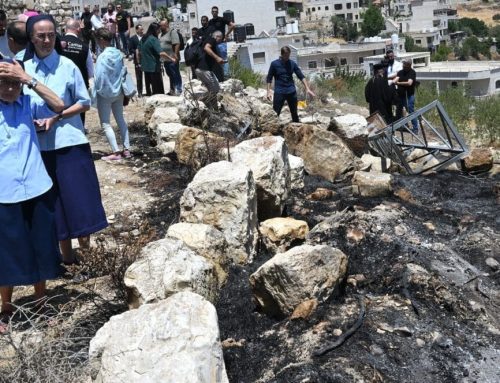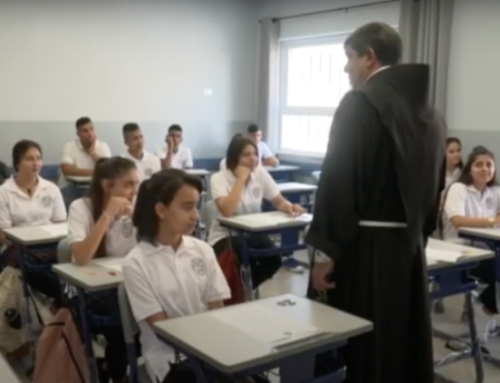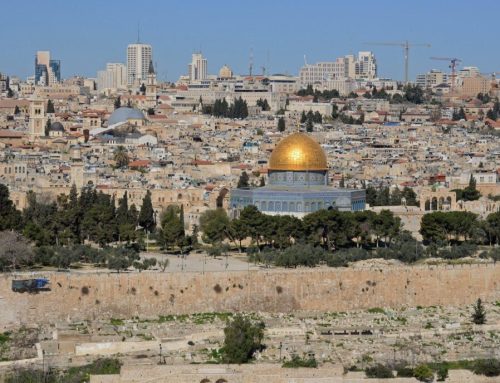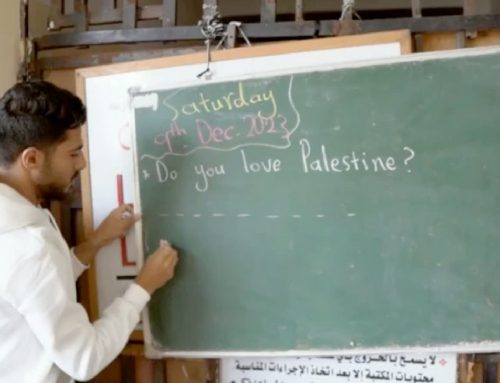“Mary said to the angel, ‘How can this be, since I am a virgin?’ The angel said to her, ‘The Holy Spirit will come upon you, and the power of the Most High will overshadow you; therefore the child to be born will be holy; he will be called Son of God. And now, your relative Elizabeth in her old age has also conceived a son; and this is the sixth month for her who was said to be barren.
For nothing will be impossible with God.’” (Luke 1:37)
Salaam and grace to you from Jerusalem, in the name of Our Lord Jesus Christ.
As we celebrate Christmas, the feast of the incarnation of the Word of God, we put all the troubles of the world behind us. For just a day or two, we become immersed in the story of Mary and Joseph, the angels and the shepherds, the star and the Wise Men who followed it. For one holy night, the miraculous story of Jesus fills our hearts and minds, drowning out the struggles of daily life.
All too soon, however, the gifts have been opened, the tree is gone, and the lights have been turned off. All too soon, Christmas is over, and the world is back to business as usual, war as usual, injustice as usual, extremism as usual—and shocking acts of terror, which are becoming far too usual.
It is a blessed and joyous thing to celebrate the birth of Our Lord, to gather with family and friends, and to sing God’s praises in our church communities. At the same time, we must really ask ourselves: “Is Christmas only a diversion or an escape from reality? Is it just a grand party? Or does it bring a more important message to our lives and to the world?”
This past year has been marked by impossibly bad acts of extremism, violence, terrorism, and war. As I have been preparing to send this message to you, nearly every day has brought news of another horrendous event: the attack on our sisters and brothers of the Coptic Church in Cairo, terror in Istanbul and Karak, the ongoing horror in Aleppo, and just in the last few hours, an attack on a Christmas market in Berlin, among others. Even in this season of joyful expectation, such horrors can make us doubt the possibility of peace, of justice, of reconciliation, and of a world which values diversity and living together.
It is for this reason that I have chosen to focus this Christmas message on Luke 1:37, which says “Nothing will be impossible with God.” This remarkable statement from an angel of the Lord reveals that the message of Christmas is not a diversion or an escape, but is really the foundation of our hope in this broken world.
When the angel came to Mary and announced that soon she would be the mother of a baby, a holy child called “Son of God”, at first, she could not believe it. She could not imagine that a simple young woman would become “theotokos”, the bearer of God. “How can this be, since I am a virgin?” she asked the angel. And the angel said to her, “Nothing will be impossible with God.”
This simple but powerful statement is often overshadowed by other familiar parts of the Christmas story, and yet it perfectly sums up the theme of every Christmas carol, every Christmas play, and every Christmas tradition. If the Son of God could be born to a virgin in Bethlehem, laid in a manger, worshipped by shepherds and foreign travelers from the East, sought by a ruthless king and chased out of the country—all before saving the world through a sacrifice of love on the cross—then truly, nothing is impossible with God.
A few days ago, I was with the King of Jordan, who had invited all the Heads of Churches to the palace to wish us a Merry Christmas. This was a moment of joy, of friendship, and of interfaith understanding. As we left the palace, however, we received the news that a terror attack in the Christian village of Karak had taken several lives. Frankly, this news spoiled our Christmas joy. It made us angry! We were asking ourselves, “How could this possibly happen? Where is the God of peace, justice, and mercy?”
This was the same anger we felt one week earlier, when the 3rd Sunday of Advent (which many honor as “Gaudete” or “Joy” Sunday) was darkened by a terror attack on St. Mark’s Cathedral in Cairo. Of course, we feel such attacks deeply when they strike at our Christian brothers and sisters. However, this attack was not only targeting Christians, but was against all of Egyptian society. It was even an attack on God, and on humanity itself. Although such attackers may claim to be lovers of God, truly they have sinned against God and against all of humanity.
When I visited Pope Tawadros II of the Coptic Orthodox Church in Cairo, along with a delegation including the Mufti of Jerusalem, my message to him was this: “Your church is an example of the church of martyria. We honor you, for you are witnessing to the Lord not only through words, but through your bodies and your blood.” Although we do not seek martyrdom in this way, truly these innocents who were killed while praying on a Sunday morning are our modern-day saints and martyrs.
Do such events frighten the Christians of the Middle East? I cannot say that it does not affect us. At the same time, as Christians in this region we are called to reflect, “What is our call as a community? What is our role in bringing peace to this region?”
I believe the answers are clear: Arab Christians are called—as are Christians in every place—to boldly carry the Gospel of love wherever we are. In the face of oppression, violence, terrorism, and occupation, our role is not to escape. We must be like the Virgin Mary, who, although she faced an impossible situation, chose to listen to the words of God’s messenger. Like Mary, when we feel the whole world is against us, we must hear the words of the angel who said, “Nothing will be impossible with God.”
There is not much evidence for optimism today, either in the world at large or here in the Middle East. The voices of exclusivity, division, intolerance, and selfishness are overpowering voices of justice, peace, and living together. People are asking: “What will happen with the peace process? Will the French initiative succeed? What will happen to Jerusalem?” Politicians, professors, and preachers love to speak about peace, but justice is missing from the conversation. Christmas comes, and the world sings “Peace on earth”, but no one is willing to take the risk to make the song a reality.
To be honest, I do not see much evidence that peace is on the horizon. It seems peace is much further away today than it ever used to be—a depressing reality as we approach the 50th anniversary of the occupation of the Palestinian territories, and the 100th anniversary of Sykes-Picot and the Balfour Declaration. I do not wish to be a prophet of doom, but if I look just at the situation today, it appears we are locked in a game of powers—and we are powerless. Often it seems we are even powerless to speak openly about peace.
No, I do not see much evidence of peace. I am not optimistic. But Christmas gives me hope. The Christmas season comes, and we do not escape from reality, but we are given the space to remember how God makes the impossible possible. In a time of hopelessness, the Prince of Peace was born. In a time in history when everything seemed to be going wrong, the hand of God proved to be stronger than the hand of the politicians. The world may be impossibly dark today, but my hope is in the one called Emmanuel, God with Us, the light of the world. What is impossible for human beings is quite possible for God—in God’s way, not in ours.
For this reason, the church should not give up its prophetic role in preaching peace, justice, and reconciliation. We will continue to proclaim the that the impossible is possible, for just as the babe in the manger surprised Mary and Joseph, so God will surprise us with a peace that passes all understanding in this land—a peace based on justice, forgiveness, and reconciliation.
Not so many years ago, it would have seemed impossible that a Lutheran bishop and the Pope would ever meet to pray together and sign a document of historic reconciliation on Reformation Day. And yet, on 31 October 2016 it was my honor, as President of the Lutheran World Federation, to join Pope Francis and the General Secretary of the LWF, the Rev. Martin Junge, for a joint prayer service in Lund and Malmö, Sweden.
This even, co-hosted by the Vatican and the LWF, was truly an historic reconciliation between the Catholic and Lutheran churches, one which has turned a new page in our relationship and dialogue. What once seemed impossible now has become possible, after 500 years. Perhaps it should have—and could have—happened sooner. But in this moment, we take the opportunity to see that this is not our work. This is the work of the Holy Spirit. The one who loves us so much that the Word became flesh and lived among us, also loves our churches, and desires our unity. For this reason, we embrace and celebrate this historic moment of unity—not uniformity, but unity of witness as one holy and apostolic church.
Nothing will be impossible with the Triune God! This is the message of Christmas, and this is the message the church of Jesus Christ is called to carry into the world after Christmas is over. When we think of the things the world says are impossible, we must know that God says they are possible: Peace is possible. Justice is possible. Reconciliation between churches and between countries is possible. Equality is possible. Diversity and living together are possible. We only need to look as far as Bethlehem and the manger to see how the things that seem impossible for us have already been made possible through the love of God in Christ Jesus.
It is with this hope that we celebrate Christmas and look to the New Year—a very special year for Lutherans, as we celebrate the 500th Anniversary of the Reformation. With great joy, and with great hope, and with great faith in the impossible love of God for the world, let us join the shepherds at the manger. Let us pour out our love for the one who has come so near to us—Our Lord in the manger, the Light of the World. And let us share the light of His love with the world.
Merry Christmas! Frohe Weihnachten! God Jul! Hyvää Joulua! Feliz Navidad!
Kul sane wa intou salmeen!
May God bless you at Christmas and in the New Year to come.
Source: Evangelical Lutheran Church in Jordan and the Holy Land






